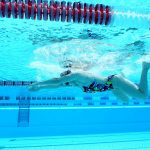Is there any point in listening to music before you dive into the pool?
We have often seen Chad Le Clos, Katinka Hosszú and lots of the world’s best swimmers listening to music before they climb onto the starting blocks. So how can music help your performance in the pool?
First of all, let’s think about how we feel when we listen to music: the sounds and words conjure up memories and pleasant feelings, but they also help us relax or energise us. All this can be extremely useful when it comes to sporting performance.
Targeted research has shed light on the mental skills and psychological constructs that music enhances.
1. The ability to detach and focus. Music can help us really focus, so that we can concentrate on positive thoughts or important stimuli related to what we were about to take on. But that is not all, music can also be invigorating and make us feel euphoric, which, to some extent, can have a positive impact on performance.
2. Controlling our level of stimulation: following the rhythm of the music we are listening to will help us regulate our level of stimulation as required. Take, for example, an athlete who is about to go to sleep the night before an important swim race. From a physiological viewpoint, listening to relaxing music will help them relax and calm them down so that they can rest properly. In contrast, the next day, if they are not feeling particularly energised, a song with a fast beat will help them feel more pumped and ready to go. It is worth remembering that when we use the expression “help” we are referring to the fact that there is no direct causal relation between listening to music and getting the results we are hoping for but it can facilitate matters. Being stimulated is much too complex a phenomenon to be controlled by just one single factor.
3. Synchronisation: you will certainly have noticed that exercising to the rhythm of music helps arm movements and makes us feel less tired. Of course, this applies to all those motor skills requiring constant and repetitive effort.
4. Learning motor skills: music provides the opportunity to explore different motion on various planes and improve coordination. Music also makes sport more enjoyable and so it encourages swimmers and athletes in general to train more.
5. Music can help us get into a ‘state of flow’.
So, creating the right playlist for various different situations can be one of many strategies to help us improve our mental preparation for a sports events or hard training session.
—————
Sources:
Karageorghis, C. I., Jones, L., & Stuart, D. P. (2008). Psychological effects of music tempi. International Journal of Sports Medicine, 29, 613-619.
Karageorghis, C. I., & Terry, P. C. (1997). The psychophysical effects of music in sport and exercise: A review. Journal of Sport Behavior, 20, 54–68.
Written by:
Arturo Mugnai
Arturo Mugnai was born in Tuscany in 1990. After competing as a backstroke swimmer, he enrolled to study psychology while continuing to write and be passionate about swimming. After completing his first degree and then his master’s, he became a sports psychologist. He firmly believes that the psychological side is vital for all sportsmen and women, even those competing in water sports. In other words, you never forget your first love.







